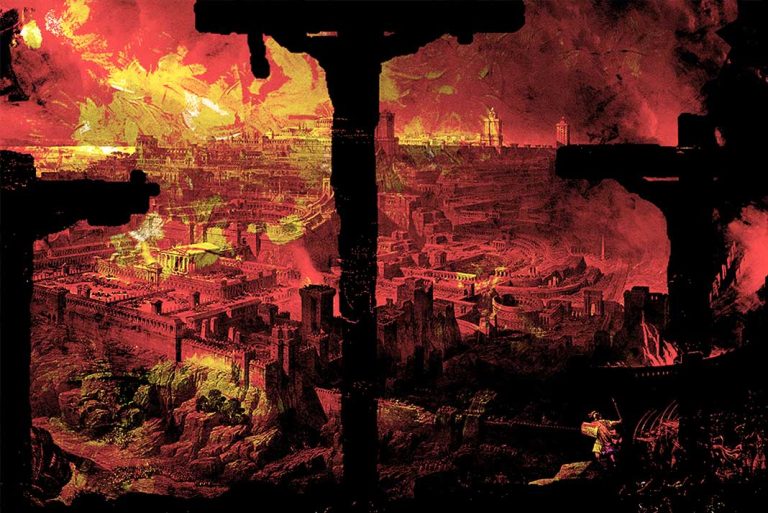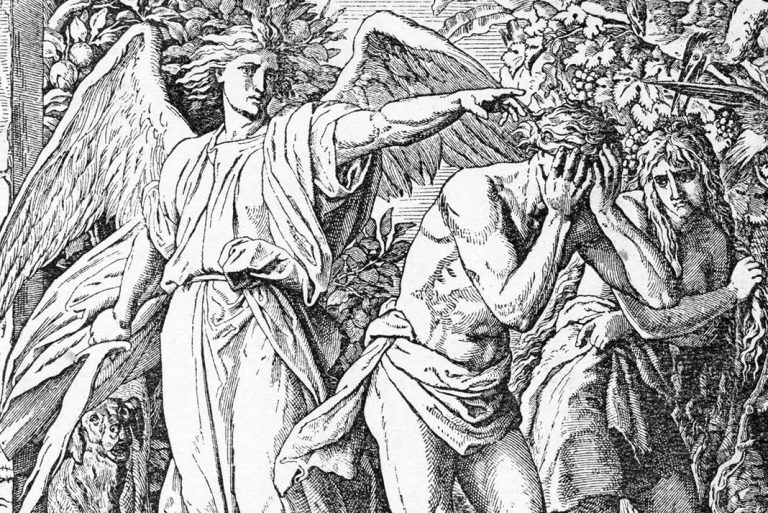It is interesting to observe in Scripture there are a number of times when there is a period of forty days attached to major events. The two most prominent of these might be the time Moses spent on Mount Sinai receiving the Law and the time Jesus spent in the wilderness while being tempted by the devil. In fact, we find nine different times when forty days are assigned to a biblical event. This is significant when you consider that 9 x 40 = 360 days; Jewish calendars in the past are represented by a 360-day year. We can conclude that these forty-day periods represent seasons of testing in the believer’s life.
The First Season
The first of these seasons is found in Genesis 7:4-5 in reference to the predicted flood: “For after seven more days, I will send rain on the earth forty days and forty nights; and I will blot out from the face of the land every living thing that I have made.” Noah did according to all that the Lord had commanded him. God is instructing Noah that his entire world is going to completely change, including the destruction of everything and everyone Noah knows. Our intimacy with God is directly related to our willingness to give up everything for His higher purpose.
The Second Season
“When I went up to the mountain to receive the tablets of stone, the tablets of the covenant which the Lord had made with you, then I remained on the mountain forty days and nights; I neither ate bread nor drank water. “The Lord gave me the two tablets of stone written by the finger of God; and on them were all the words which the Lord had spoken with you at the mountain from the midst of the fire on the day of the assembly. “It came about at the end of forty days and nights that the Lord gave me the two tablets of stone, the tablets of the covenant. “Then the Lord said to me, ‘Arise, go down from here quickly, for your people whom you brought out of Egypt have acted corruptly. They have quickly turned aside from the way which I commanded them; they have made a molten image for themselves.’ “The Lord spoke further to me, saying, ‘I have seen this people, and indeed, it is a stubborn people. ‘Let Me alone, that I may destroy them and blot out their name from under heaven; and I will make of you a nation mightier and greater than they.’ (Deuteronomy 9:9-14)
When God called Moses to Mount Sinai, the people trembled at the sight of the mountain smoking, with fire and quaking, a picture of God’s judgment. In Exodus 20:18-19, All the people perceived the thunder and the lightning flashes and the sound of the trumpet and the mountain smoking; and when the people saw it, they trembled and stood at a distance. Then they said to Moses, “Speak to us yourself and we will listen; but let not God speak to us, or we will die.” The people needed Moses to do something they were afraid to do themselves: approach God directly. God’s answer was to provide His Law, the Law of Moses, that would redefine life for every Jew for more than 1,400 years. This second season was the search for perfect justice. But would they accept His challenge?
When Moses came down off Mount Sinai to deliver the Law, he found the people, led by his brother Aaron, worshipping a golden calf. As a result, he smashed the two tablets. The very first of the Ten Commandments, found in Exodus 20:2-3, is “I am the Lord your God, who brought you out of the land of Egypt, out of the house of slavery. “You shall have no other gods before Me.” A relationship with the God of Israel is the worship of Yahweh only. This rejection of the Law is a picture of the rejection of Jesus as Messiah at His first coming (John 1:11). The perfect justice of God, the Messiah would need to be postponed until a later time.
The Third Season
In the meantime, God called Moses back to Mount Sinai again in Exodus 34 for forty days and nights and in Verse 28, So he was there with the Lord forty days and forty nights; he did not eat bread or drink water. And he wrote on the tablets the words of the covenant, the Ten Commandments. Moses was intervening on behalf of the people to make atonement for them before the Lord so that He would not destroy them (see Deuteronomy 9:14). God’s answer was to reinstitute His Law. The third season was God’s call on Moses to intervene on behalf of His people. There are times when He calls the believer to be an intercessor.
The Fourth Season
The fourth of these seasons is found in Numbers 13 when the Lord instructed Moses to choose twelve representatives, one from each tribe, to be spies to enter the promised land in secret and investigate the land. In Numbers 13:25, this represented a period of forty days. They would return with an account of the fruitfulness of the land as well as the obstacles the people would face. Of course, ten of them said that the obstacles were too great while Joshua and Caleb had the opposite recommendation. It represents a season in the believer’s life when he must face the future with an eye on the ability of God instead of the greatness of the dangers ahead. The people sided with the ten and they were delayed in inhabiting their promised land for another thirty-eight years.
The Fifth Season
The angel of the Lord came again a second time and touched him and said, “Arise, eat, because the journey is too great for you.” So, he arose and ate and drank, and went in the strength of that food forty days and forty nights to Horeb, the mountain of God. Then he came there to a cave and lodged there; and behold, the word of the Lord came to him, and He said to him, “What are you doing here, Elijah?” He said, “I have been very zealous for the Lord, the God of hosts; for the sons of Israel have forsaken Your covenant, torn down Your altars and killed Your prophets with the sword. And I alone am left; and they seek my life, to take it away.” So, He said, “Go forth and stand on the mountain before the Lord.” And behold, the Lord was passing by! And a great and strong wind was rending the mountains and breaking in pieces the rocks before the Lord; but the Lord was not in the wind. And after the wind an earthquake, but the Lord was not in the earthquake. After the earthquake a fire, but the Lord was not in the fire; and after the fire a sound of a gentle blowing [whisper]. (1 Kings 19:7-13)
Immediately after the great victory that Elijah experienced on Mount Carmel, it became clear that Queen Jezebel and King Ahab would be after Elijah for his life. Instead of operating in his faith as he had done previously, Elijah became afraid for his life and ran. There are times when even the most fervent believers have times of doubt and allow fear to reign instead of faith in God. In the midst of that struggle, God strengthened Elijah supernaturally to traverse the desert forty days to get to Horeb [Sinai], the mountain of God. God was reminding Elijah of His covenant with Israel. The fifth season represents the times when even the most ardent believer must be reminded of the foundation of his faith. These reminders do not usually come by some incredible display like a fire or an earthquake, but most often through the sound of a gentle whisper, the voice of God heard inside by man’s spirit.
The Sixth Season
When King Saul and the people were being challenged by the giant Philistine, Goliath, in the Valley of Elah, as stated in 1 Samuel 17:16, “The Philistine came forward morning and evening for forty days and took his stand.” This challenge represents the times when the believer faces a formidable difficulty with no clear solution to the problem. The sixth season is found in learning to wait on God for His supernatural provision, even when it represents a stone thrown by a teenager, even if it takes forty days.
The Seventh Season
Jonah was commanded by God to go to Nineveh and warn the Assyrians to repent or severe judgment from God would come upon them. Jonah had a problem with this and instead headed in the opposite direction. Of course, God had other plans and, after spending three days and nights in the fish, Jonah finally agreed to fulfill God’s wishes. In Jonah 3:4, Then Jonah began to go through the city one day’s walk; and he cried out and said, “Yet forty days and Nineveh will be overthrown.” God was giving Nineveh forty days to repent. And they did! This is the seventh season of testing. Jonah had a problem with a compassionate God offering forgiveness to such a wicked people.
In Jonah 4, Jonah laments over a plant God gave him to be shade from the sun, that it died. The Lord used this issue as a teaching lesson for Jonah, that everyone deserves the compassion of a longsuffering God:
Then God said to Jonah, “Do you have good reason to be angry about the plant?” And he said, “I have good reason to be angry, even to death.” Then the Lord said, “You had compassion on the plant for which you did not work and which you did not cause to grow, which came up overnight and perished overnight. “Should I not have compassion on Nineveh, the great city in which there are more than 120,000 persons who do not know the difference between their right and left hand, as well as many animals?” (Jonah 4:9-11)
The Eighth Season
Directly after the baptism of Jesus in the Jordan River, Jesus was tested by the devil in the wilderness. He would be tested in three aspects of His ministry: provisions of life, God’s power, and His providence. The eighth season of testing involves the spiritual warfare that attacks the believer in relation to basic issues of life. In each case, the answer to the test is the Word of God: It is written.
Provision
Then Jesus was led up by the Spirit into the wilderness to be tempted by the devil. And after He had fasted forty days and forty nights, He then became hungry. And the tempter came and said to Him, “If You are the Son of God, command that these stones become bread.” But He answered and said, “It is written, ‘MAN SHALL NOT LIVE ON BREAD ALONE, BUT ON EVERY WORD THAT PROCEEDS OUT OF THE MOUTH OF GOD.'”
Power
Then the devil took Him into the holy city and had Him stand on the pinnacle of the temple, and said to Him, “If You are the Son of God, throw Yourself down; for it is written, ‘HE WILL COMMAND HIS ANGELS CONCERNING YOU’; and ‘ON their HANDS THEY WILL BEAR YOU UP, SO THAT YOU WILL NOT STRIKE YOUR FOOT AGAINST A STONE.'” Jesus said to him, “On the other hand, it is written, ‘YOU SHALL NOT PUT THE LORD YOUR GOD TO THE TEST.'”
Providence
Again, the devil took Him to a very high mountain and showed Him all the kingdoms of the world and their glory; and he said to Him, “All these things I will give You, if You fall down and worship me.” Then Jesus said to him, “Go, Satan! For it is written, ‘YOU SHALL WORSHIP THE LORD YOUR GOD, AND SERVE HIM ONLY.'”
Then the devil left Him; and behold, angels came and began to minister to Him. (Matthew 4:1-11)
The Ninth Season
The ninth season of testing is found in Acts 1:3 as Jesus is preparing for His ascension. He has been with His disciples for forty days since His resurrection, preparing them for the church age when He will be removed, and replaced by the Holy Spirit, the Spirit of Christ, the Spirit of Truth, who will guide each believer into the truth. Jesus promises His disciples that, “but you will receive power when the Holy Spirit has come upon you; and you shall be My witnesses both in Jerusalem, and in all Judea and Samaria, and even to the remotest part of the earth.” As each believer transitions from a religious life to a spiritual life by the Holy Spirit, his life will be tested in every area to trust God for every provision, as he consults the Word of God for strength and understanding.









